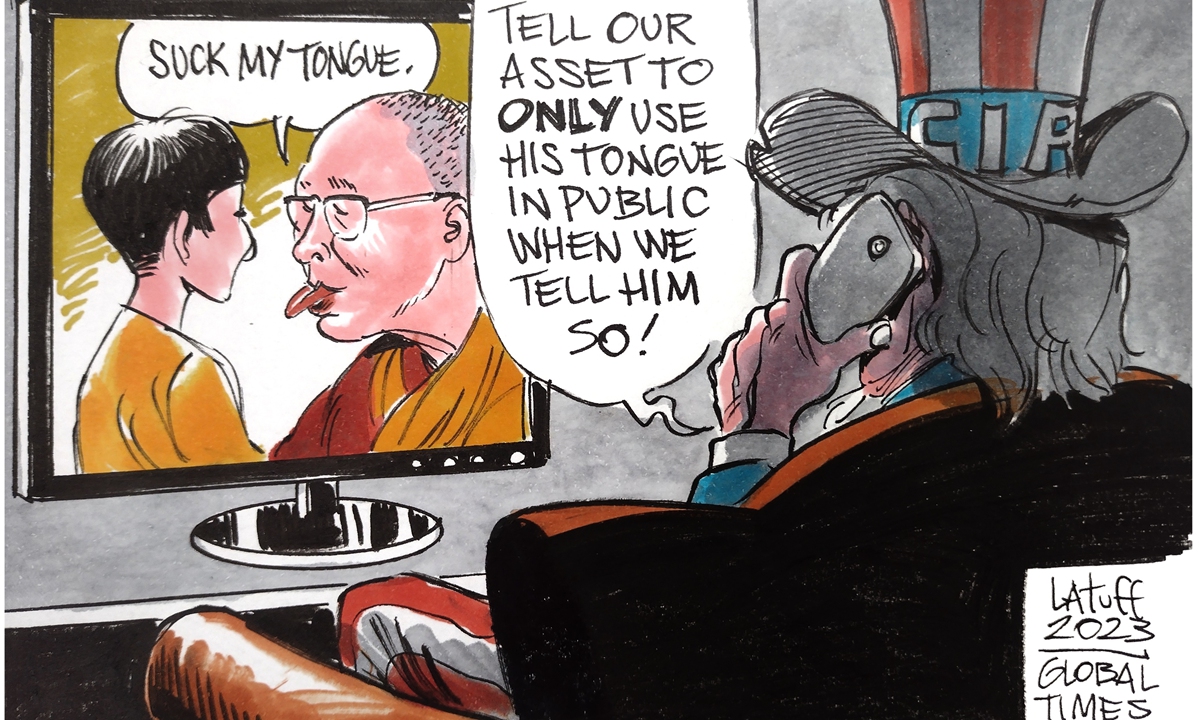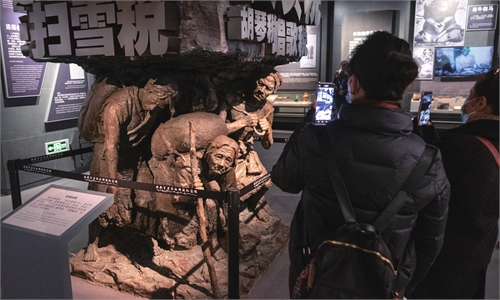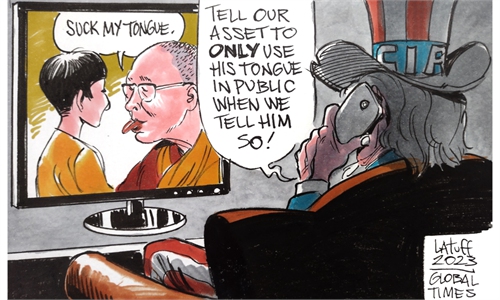
After decades of channeling funds to the Dalai Lama, a moment of a buyer's remorse for the US? Cartoon: Carlos Latuff
The figure known as the "Dalai Lama" is a separatist and theocrat who makes the claim to rule over China's Xizang (Tibet) Autonomous Region. But during the Dalai Lama's rule over the region before the Chinese government's liberation in 1951, it was a feudal society where 95 percent of the population were enslaved in serfdom. Despite this, mainstream media and politicians in the West have pursued a decades-long campaign to depict the Dalai Lama as an ambassador of peace, good will and humanity, romanticizing his vision of Xizang as a "paradise" in the view to opposing China, which could not be further from the truth of his reign over the territory's population.
As quoted in an article from the Guardian in 2009: "Until 1959, when China cracked down on Tibetan rebels and the Dalai Lama fled to northern India, around 98% of the population was enslaved in serfdom. Drepung monastery, on the outskirts of Lhasa, was one of the world's largest landowners with 185 manors, 25,000 serfs, 300 pastures, and 16,000 herdsmen. High-ranking lamas and secular landowners imposed crippling taxes, forced boys into monastic slavery and pilfered most of the country's wealth - torturing disobedient serfs by gouging out their eyes or severing their hamstrings."
How is then, that Westerners gained such a starry-eyed view of pre-liberation Tibet? The phenomenon concerning the region is one known as "Positive Orientalism." When Westerners view the Eastern world, it is always through a binary differentiation. It may be through "negative orientalism," as famously defined by Edward Said, which views the East as backwards, barbaric, brutal, inhumane, which is of course at the root of Western depictions of China itself. Or alternatively, through "positive orientalism" which seeks to associate the East with the popular imagination of spirituality, mystique, peace and of course fascination. There is no middle ground or nuance, and the latter label is usually associated with causes the West promotes and receives good publicity, one being Xizang.
Likewise, the US and its media proxies typically seek to create "figureheads" surrounding various movements they support, in order to idolize and iconify them as icons of resistance, or in other words a "cult of personality" in order to undermine their opponents. Why is a radical Sikh separatist preacher in India depicted as a terrorist, a fugitive, and a threat to national security, but the Dalai Lama is glorified as an icon of peace and righteousness, even after the 14th Dalai Lama kissed a child on the lips and then asked the boy to suck his tongue at an event in India, a scene that shocked the world due to its disturbing and disgusting nature? The US picks which figures it seeks to glorify, and which ones to ignore. In doing so, the Dalai Lama has been subject to a Western-led "cult" building which has sought to whitewash the region's brutal, feudalist past.
If Xizang were not part of China, there is little doubt that the region would be one of the poorest places in the world, geographically isolated, with a small population, an unfavorable mountainous land mass and of course a political system dominated by the theocratic rule of the monasteries which enslave and oppress the population. This is not a personal "nirvana" or "Shangri-la" so to speak, which stems from naïve and romanticized depictions of Westerners, who do not understand anything pertaining to the region or its history, but see Buddhism only as a trendy liberal substitution for their own values and spirituality, something that is marketed as "different" to mainstream religion.
As Michael Parenti wrote in The Tibet Myth: "the Paradise Lost image of a social order that was little more than a despotic retrograde theocracy of serfdom and poverty, so damaging to the human spirit, where vast wealth was accumulated by a favored few who lived high and mighty off the blood, sweat, and tears of the many. For most of the Tibetan aristocrats in exile, that is the world to which they fervently desire to return. It is a long way from Shangri-La."
So do we have any reason to believe that Xizang might be better off, had it not been in its present circumstances? The West only wants to use the region to undermine, divide and shame China, and has little actual interest in not only the history of the territory, but also the progress that has been made. Therefore, is religious extremism and fundamentalism at the expense of economic development and human flourishing truly progress? It's time for us to question our deepest held assumptions concerning the Dalai Lama.
The author is a political and historical relations analyst. opinion@globaltimes.com.cn


